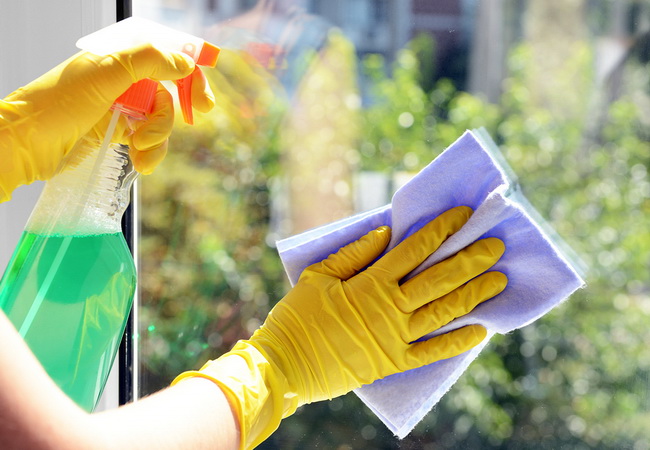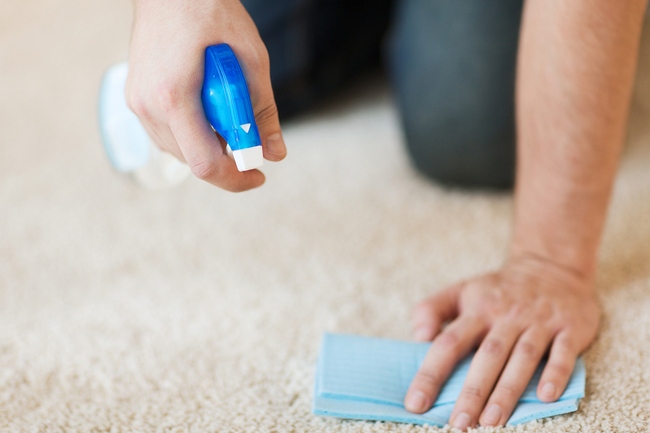- Make It Yourself Lavender Heart-Shaped Bath Bombs!
- 20 Things You Never Knew About “Down There”
- 12 Best Foods For Those Suffering From Arthritis Pain
- 12 Personal Hygiene Mistakes Almost Everyone Makes (Mom Never Told You About #4!)
- 15 Medicinal Plants And Herbs From The Cherokee People
- 12 Mind-Blowing Benefits Of Drinking Coconut Water During Pregnancy
- 12 Outstanding Winter Foods That Won’t Fatten You Up Like A Christmas Turkey
6 Cleaning Products That Are A Serious Danger To Your Health

Photo credit: bigstockphoto.com
As children growing up, most of us were given chores to help with the cleaning and maintenance of our home. Furniture needed to be dusted, dishes needed to be washed, and bathrooms needed to be sanitized. Many of the same cleaning products that were around then are still on the market today. They are also stronger and more powerful cleaning products now that were created to make cleaning faster and easier.
The problem with most cleaning products is that they contain chemicals that are dangerous to our health. Some people think that they won’t hurt you if you are exposed to them on a limited basis but the consensus is that it is the repeated exposure that builds up, and creates, problems in the long run.
One of the main reasons that cleaning products pose a risk to our health is because there are no federal regulations that govern the safety of their usage. Our food is held to specific guidelines but even though we inhale these cleaning products there are only warnings on the labels cautioning use around children and pets. If you suffer from allergies, or have a compromised immune system, you may not even realize that some of these cleaning products could be making you sick.
Listed below are some of the most dangerous cleaning products that you could use. You are probably wondering how you will be able to keep your home clean without them. There are simple cleaning products you can put together yourself that are natural, chemical-free, and just as effective as the dangerous products you have been using.
1. Liquid dishwashing detergents and antibacterial sanitizers
Many dishwashing products contain a chemical called triclosan. This product is an antibacterial agent that may have an effect on the function of the endocrine gland. In addition, excessive use of antibacterial sanitizers could cause you to build up a resistance to them eventually making them ineffective. Look for products without triclosan in them.
Safer substitute: dishwashing products that have just a few ingredients on their label. Look for sanitizers that do not have triclosan and have an alcohol base.
Continue to Page 2

Photo credit: bigstock.com
2. Window cleaners
A substance called 2-butoxyethanol can be found in a number of products that are used to clean windows and mirrors. This toxin is pretty serious even though it is used to give the cleaner a more fragrant aroma. It falls into a group of solvents that are called glycol ethers and it has been found to initially produce a sore throat in the person using it but can also lead to serious kidney and liver damage, narcosis, and possibly pulmonary edema. This ingredient is not required to be listed on the label.
Safer substitute: create a mixture of vinegar and water and wipe windows and mirrors with newspaper. Your windows will be sparkling clean with no streaks.
3. Fragrant soaps and air fresheners
Many scented soaps and especially air fresheners have a chemical known as phthalates in them. Because there are no regulations regarding any of these toxic compounds they do not have to be identified on the label, but if you see the word fragrance it probably contains phthalates in it. This compound has been found to lower a man’s sperm count when inhaled or absorbed by the skin.
Safer substitute: replace air fresheners in your home with essential oils. Instead of spray fresheners try selecting plants to detoxify the air in your home.
Continue to Page 3

Photo credit: bigstock.com
4. Stain removers and carpet cleaners
If you bring your clothing to a dry cleaner on a regular basis you are subjecting yourself to a neurotoxin called perchloroethylene also known as perc. People
who have been exposed to perc have suffered from incoordination and dizziness. The same side effects have been reported from people who have their carpets professionally cleaned and have breathed in the fumes from the cleaner.
Safer substitute: you don’t have to give up your “dry clean only” fashions, simply ask your dry cleaner if they offer wet cleaner services. If you need to remove a stain you can try a degreaser that uses natural ingredients or rub castile soap right on the stained item before you wash it.
5. Fabric softeners
Another type of antibacterial product fall under the category of quaternary ammonium compounds also referred to as quats. These products are most often used in the liquids and sheets used to soften our laundry when put through the washer or dryer. They have been recognized as a major skin irritant, the reason for many respiratory disorders, and the main culprit in dermatitis after a 10-year study. Quats were also blamed for the development of asthma in healthy people who were exposed to them regularly.
Safer substitute: the easiest and safest ways to not only soften your clothes, but eliminate static is to substitute vinegar for your fabric softener. Add some vinegar in your rinse cycle and it will cut out the residue of soap that sometimes lingers on clothes.
Continue to Page 4

Photo credit: bigstock.com
6. Oven cleaners and drain cleaners
The key ingredient in oven and drain cleaners is sodium hydroxide, or lye. This compound is responsible for inflicting serious burns on the skin. It can also result in a persistent sore throat.
Safer substitutes: make a paste out of baking soda and you can safely clean your oven without being exposed to the dangerous fumes found in most oven cleaners. A combination of vinegar and baking soda will clear a clogged drain. Wait 30 minutes after pouring them down the drain and then follow it with hot water to get the clog moving along.
Natural Cleaners
- Furniture polish – instead of dusting, wipe furniture with a microfiber cloth. Add a dab of olive oil if you would like to shine your furniture.
- Carpet cleaner – 3/4 cup of a liquid soap that has a vegetable base mixed with 3 cups of water and up to 10 drops of essential oil can be sponged onto your carpet. When it’s dry just vacuum it up.
READ ALSO: Stop Poisoning Yourself – Make Your Own Safe Scouring Powder
- Sink cleanser – rinse your sink and sprinkle 1/2 cup of baking soda into your sink and top it with 1/4 cup of vinegar. You can use your favorite essential oil if you want a specific fragrance.
References:





























